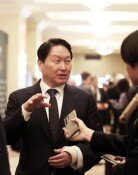[Editorial] Labor Compromises?
[Editorial] Labor Compromises?
Posted February. 13, 2006 06:26,
Labor Minister Lee Sang-soo says he wants to make dialogue and compromise the basis of his labor policies and seek to strike a balance between labor, management, and the government.
Dialogue and compromise are good concepts. Nevertheless, they should always be realized within the framework of the law.
The Korean Confederation of Trade Unions (KCTU) failed to even select its leadership in a democratic way in its regular meeting. It is unclear whether Lee will be able to create a framework for consensus through dialogue and compromise with such a labor federation.
The KCTU has been so divided that it failed to select its next chairman and saw its emergency commission paralyzed. Even its former chairman, Lee Soo-ho, criticized the federation by saying, The problem is people are ready to ruin everything. It is a sham organization that rarely finishes its meetings.
Regardless of the understanding that is reached by labor, management, and the government through difficult dialogue, it is likely that it will be ruined by the leadership-lacking KCTU. At a time when the KCTU, which frequently turns to general strikes and violent demonstrations, refuses to show signs of self-innovation, merely emphasizing dialogue and compromise might put businesses in difficulty and destroy law and principles without gaining anything.
Former Labor Minister Kim Dae-hwan says, This year, labor unions should change their militant postures and seek to make sincere negotiations with management. This is something that the trade unions should keep in mind. Kim had been classified as a liberal economist in academia, but after taking office as labor minister, he has striven to protect the law against illegal labor behavior and stubbornness.
Lee was brought into custody when leading labor movements as a lawyer; and he has been considered pro-labor even after becoming a politician. Like his predecessor, however, he should change once he becomes a minister.
Back in the 1980s when Lee was working as a labor lawyer, labor unions were weak and in need of protection and support. But now the KCTU has emerged as a significant force with vested interests that is capable of replacing ministers it does not like. Hardline labor forces are neither conservative nor liberal; it would be fair to call them ruin-everything reactionary, who stick to their own vested interests based on the sacrifice of worse-off workers.
Lee should take the right first step. Being at the labor unions beck and call might make him popular among some people, but is likely to make him a failed minister. He might even further damage the economy. On him falls the responsibility to apply labor policies befitting the era of globalization to change a labor circle that relies on the inertia of the past.







